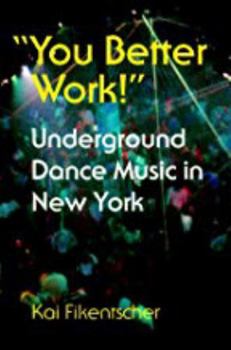You Better Work!: Underground Dance Music in New York
Select Format
Select Condition 
Book Overview
The first in-depth study of underground dance music.
"You Better Work " is the first detailed study of underground dance music or UDM, a phenomenon that has its roots in the overlap and cross-fertilization of African American and gay cultural sensibilities that have occurred since the 1970s. UDM not only predates and includes disco, but also constitutes a unique performance practice in the history of American social dance.
Taking New York City as its geographic focus, "You Better Work " shows how UDM functions in the lives of its DJs and dancers, and how it is used as the primary identifier of an urban subculture shaped essentially by the relationships between music, dance, and marginality. Kai Fikentscher goes beyond stereotypical images of club and disco to explore the cult and culture of the DJ, the turntable and vinyl recordings as musical instruments, and the vital relationship between music and dance at underground clubs. Including interviews, photographs, and an extensive discography, this ethnographic account tells the story of a celebration of collective marginality through music and dance





